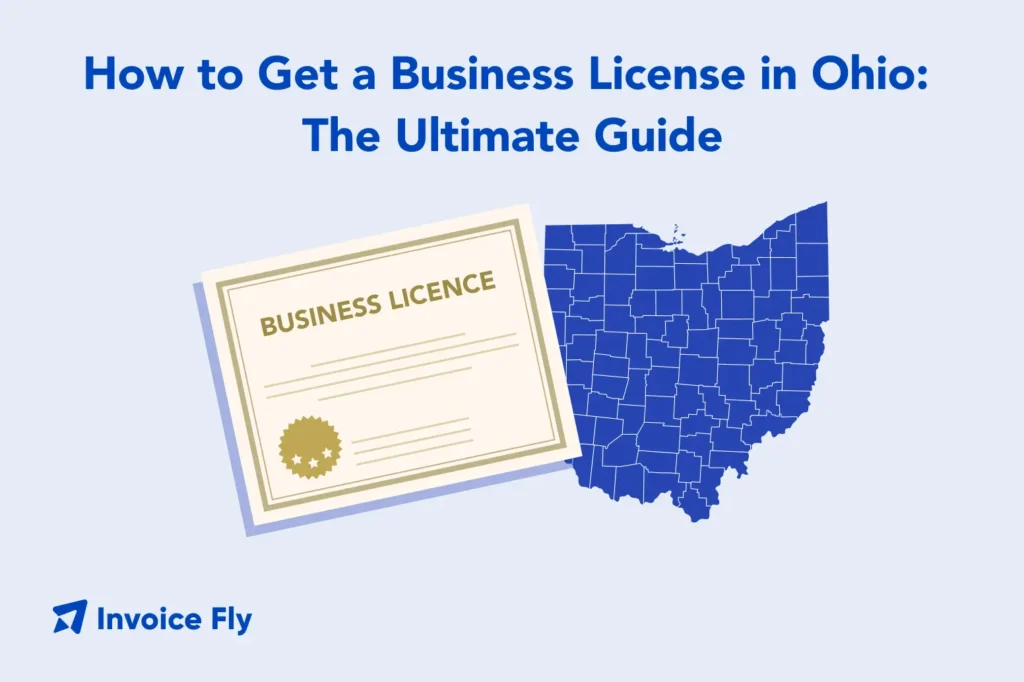How to Get a Business License in Ohio: The Ultimate Guide

Table of Contents
- What sets Ohio apart from other states for entrepreneurs?
- Is a business license required in Ohio?
- Types of Ohio business licenses
- Local business licenses in Ohio
- Statewide business licenses in Ohio
- Federal business licenses and permits
- Steps To Start Your Business in Ohio
- Advantages and disadvantages of starting a business in Ohio
- Resources for starting a business in Ohio
- Final Thoughts
- FAQs About Getting Your Ohio Business License
Thinking of starting a business in Ohio? You’ll likely need a business license to operate legally. Whether you’re launching a service like HVAC, plumbing, or general contracting—or registering an LLC or sole proprietorship—understanding the business license Ohio process is essential.
In this ultimate guide, we’ll break down the local, state, and federal requirements, along with the steps to register your business and obtain the right permits in 2025.

What sets Ohio apart from other states for entrepreneurs?
Ohio is known for its affordable cost of living, central location, and strong support for small businesses. Unlike many states, Ohio has no personal property tax on business inventory and Ohio Secretary of State offers a range of tax credits and incentive programs.
Major cities like Columbus, Cleveland, and Cincinnati are thriving business hubs, offering access to diverse industries and skilled talent. According to JobsOhio, the state’s central location makes it a logistics powerhouse—within a day’s drive of 60% of the U.S. and Canadian populations, ideal for distribution and supply chain businesses.

Is a business license required in Ohio?
It depends. Ohio doesn’t issue a general statewide business license, but many industries and municipalities require one. Blue-collar jobs like HVAC, handyman services, and general contracting usually need both local and state-level licenses.
Consulting, e-commerce, and online LLCs may not require a license but might need permits or tax registrations depending on location and services provided.
Types of Ohio business licenses
Business licenses in Ohio fall into three main categories:
| License Type | Issued By | Applies To |
| Local License | City/County | General business operations |
| State License | State Agencies | Regulated professions (e.g., contractors, healthcare) |
| Federal License | Federal Government | Interstate or federally regulated industries |
Understanding which applies to your business helps you navigate licensing more effectively.
Local business licenses in Ohio
Most businesses in Ohio need some form of local business license or permit. These are issued by the city, county, or township where you plan to operate.
Common local licenses include:
- General business licenses: Required by most municipalities for businesses operating within city limits.
- Zoning permits: Ensure your business location complies with local zoning regulations.
- Building permits: Required for construction, renovation, or significant modifications to business premises.
- Fire department permits: Needed for businesses handling flammable materials or large public gatherings.
- Health department permits: Required for food service, healthcare, or businesses affecting public health.
Each municipality sets its own requirements, fees, and renewal schedules. Always contact your local city hall to find specific requirements.
Statewide business licenses in Ohio
State-level licensing in Ohio primarily applies to regulated professions and industries. These licenses ensure businesses meet safety, competency, and ethical standards.
Common state licenses include:
- Construction contractor licenses: Required for general contracting, electrical work, plumbing, and HVAC installation.
- Professional licenses: Needed for accountants, real estate agents, healthcare providers, and other licensed professions.
- Retail licenses: Required for businesses selling alcohol, tobacco, or firearms.
- Transportation licenses: Needed for trucking, taxi services, and commercial vehicle operations.
- Environmental permits: Required for businesses that may impact air quality, water resources, or waste management.
The Ohio Department of Commerce manages most professional and trade licenses, while other state agencies oversee industry-specific requirements.
Federal business licenses and permits
Federal licenses may be required if your business involves:
- Transportation across state lines (DOT)
- Import/export activities, Customs & Border Protection (CBP)
- Alcohol or tobacco production (TTB)
- Broadcasting (FCC)
Visit IRS.gov, FinCEN.gov, or SBA.gov for federal requirements.
Steps To Start Your Business in Ohio
1: Choose a name
Your business name must be unique and comply with Ohio naming requirements. For an LLC, the name must include “Limited Liability Company,” “LLC,” or similar abbreviation. Use the Ohio SOS business database to check availability.
2: Choose a Business Structure
Ohio recognizes several business structures, each with different legal, tax, and operational implications:
- Sole Proprietorship: Simplest structure for single-owner businesses with minimal regulatory requirements.
- Partnership: For businesses with multiple owners sharing profits and responsibilities.
- Limited Liability Company (LLC): Provides personal liability protection with flexible management structure and tax options.
- Corporation: Formal structure with shareholders, directors, and officers, offering strong liability protection but more complex requirements.
- S Corporation (S-Corp): Special tax election allowing corporate liability protection with pass-through taxation.
Most small businesses choose LLC formation for its flexibility and protection benefits.
3: Register your business
Register your entity with the Ohio Secretary of State. LLCs pay a $99 filing fee.
The registration process includes:
- Filing appropriate formation documents
- Paying required state fees
- Appointing a registered agent in Ohio
- Creating an operating agreement (recommended for LLCs)
4: Obtain an Employer Identification Number (EIN)
Most businesses need an EIN from the IRS, even if they don’t have employees. The EIN serves as your business’s tax identification number and is required for:
- Opening business bank accounts
- Filing tax returns
- Hiring employees
- Setting up business credit
5: Open a Business Bank Account
To open a dedicated business bank account, use your EIN and formation documents:
- EIN or Social Security Number
- Business formation documents
- Business license (if applicable)
- Initial deposit
Before opening your account, it’s a good idea to estimate your expected income, expenses, and profit margins to better manage cash flow and select the right banking products.
Need help with planning? Learn how to create financial projections so you can open your account with a clear understanding of your business’s financial needs.
6: Obtain your Business License and Permits
Visit Tax.Ohio.gov to register for any required state taxes and business licenses. The exact steps vary by industry and location, but most businesses will need to:
- Identify which licenses and permits apply to your operation
- Complete and submit the appropriate applications
- Pay any required fees
- Provide supporting documentation (e.g., insurance, zoning approvals)
- Schedule and pass inspections, if necessary
Pro Tip: Blue-collar businesses—like general contracting, HVAC, plumbing, and handyman services—often require specialized trade licenses in addition to general business registration.
Check out these helpful guides based on your trade:
- How to Get Handyman License Requirements
- How to Get a Plumbing License in 2025? 6 Simple Steps
- Step-by-Step Landscaping License Guide

7: Research Insurance and Legal Obligations
Protect your business with appropriate insurance coverage and ensure compliance with legal requirements:
- General liability insurance protects against third-party claims and is often required for contractors and service businesses.
- Workers’ compensation insurance is mandatory if you have employees.
- Professional liability insurance may be required for licensed professionals.
Research tax obligations, employment law requirements, and industry-specific regulations that apply to your business.
8: Report Beneficial Ownership — New as of 2024!
The Corporate Transparency Act now requires most U.S. businesses to report information about their beneficial owners (individuals who ultimately own or control the company) to the U.S. Department of Treasury’s Financial Crimes Enforcement Network (FinCEN). This helps prevent fraud, money laundering, and other illicit activities.
Submit your report through FinCEN.gov/BOI. You must file this within 30 days of formation or ownership changes.
9: Comply with Hiring Requirements
Ohio employers must fulfill several hiring-related obligations:
- Register with the Ohio New Hire Reporting Center to report new and rehired employees within 20 days.
- Bureau of Workers’ Compensation (BWC): Register at bwc.ohio.gov to obtain required workers’ comp coverage if you have employees.
- Ohio Department of Job and Family Services (ODJFS): You may need to set up an unemployment compensation account. Visit jfs.ohio.gov and search for employer responsibilities.
10: Report Unclaimed Funds Annually
By Ohio law, all businesses must report unclaimed funds to the Ohio Department of Commerce, even if no unclaimed funds exist. This includes forgotten paychecks, refunds, or customer credits.
Use the Unclaimed Funds Portal to file your annual report. Failure to comply may result in penalties.
Advantages and disadvantages of starting a business in Ohio
Advantages
- Low real estate and operating costs
- Access to a large customer base within driving distance
- Generous tax credits for small businesses
- Skilled local workforce
Disadvantages
- Seasonal weather can disrupt certain services
- Population decline in rural areas
- Complex mix of local and state rules
Resources for starting a business in Ohio
State Government Resources
- Ohio Secretary of State
- Ohio Development Services
- Ohio Department of Commerce
- Ohio Department of Taxation
Local Resources
- Small Business Development Centers (SBDCs)
- City economic development departments
- Local Chambers of Commerce:
Additional and Online Resources
- WaveApps: Business Licensing Guide
- Stripe’s Ohio Startup Guide
- SBA Ohio District
- Invoice generator
- Free profit margin calculator

Final Thoughts
Getting your business license in Ohio is straightforward when you break it down step-by-step. From filing your LLC to obtaining local permits, the process is an investment in your business’s legitimacy and success.
Ohio offers real advantages: low operating costs, central location, and strong small business support. Whether you’re starting a general contracting business or handyman service, proper licensing sets you up for long-term growth.
Start early, stay organized, and create a checklist of required licenses for your industry. As you grow, professional invoicing helps establish credibility with customers from day one.
With your licenses in hand, you’ll be ready to join Ohio’s thriving business community.
Need an invoicing solution for your small business? Try Invoice Fly’s Invoice Maker — It’s free!
FAQs About Getting Your Ohio Business License
Anywhere from $25 to $500+, depending on the type and location.
Most licenses renew annually. Check your local or state agency for timelines and fees.
Yes, depending on the business type and location.
An EIN is a federal tax ID. A business license gives you permission to operate locally or statewide.
Permits allow specific activities (like food handling); licenses cover general business operations.
Forming an LLC doesn’t replace licensing requirements. You may still need local and industry-specific licenses.
